2007 CHEVROLET AVALANCHE service indicator
[x] Cancel search: service indicatorPage 436 of 618
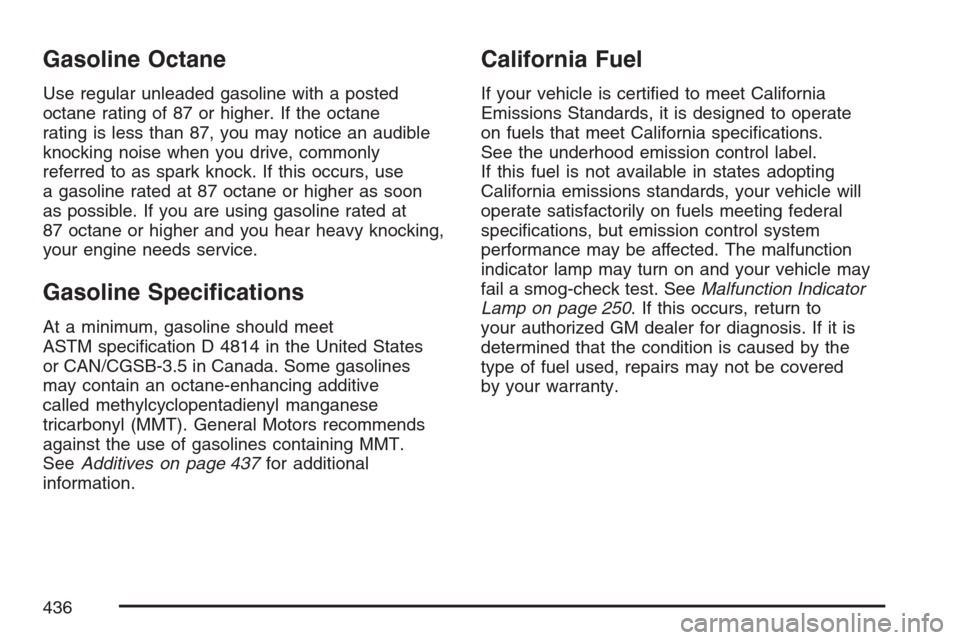
Gasoline Octane
Use regular unleaded gasoline with a posted
octane rating of 87 or higher. If the octane
rating is less than 87, you may notice an audible
knocking noise when you drive, commonly
referred to as spark knock. If this occurs, use
a gasoline rated at 87 octane or higher as soon
as possible. If you are using gasoline rated at
87 octane or higher and you hear heavy knocking,
your engine needs service.
Gasoline Speci�cations
At a minimum, gasoline should meet
ASTM speci�cation D 4814 in the United States
or CAN/CGSB-3.5 in Canada. Some gasolines
may contain an octane-enhancing additive
called methylcyclopentadienyl manganese
tricarbonyl (MMT). General Motors recommends
against the use of gasolines containing MMT.
SeeAdditives on page 437for additional
information.
California Fuel
If your vehicle is certi�ed to meet California
Emissions Standards, it is designed to operate
on fuels that meet California speci�cations.
See the underhood emission control label.
If this fuel is not available in states adopting
California emissions standards, your vehicle will
operate satisfactorily on fuels meeting federal
speci�cations, but emission control system
performance may be affected. The malfunction
indicator lamp may turn on and your vehicle may
fail a smog-check test. SeeMalfunction Indicator
Lamp on page 250. If this occurs, return to
your authorized GM dealer for diagnosis. If it is
determined that the condition is caused by the
type of fuel used, repairs may not be covered
by your warranty.
436
Page 437 of 618
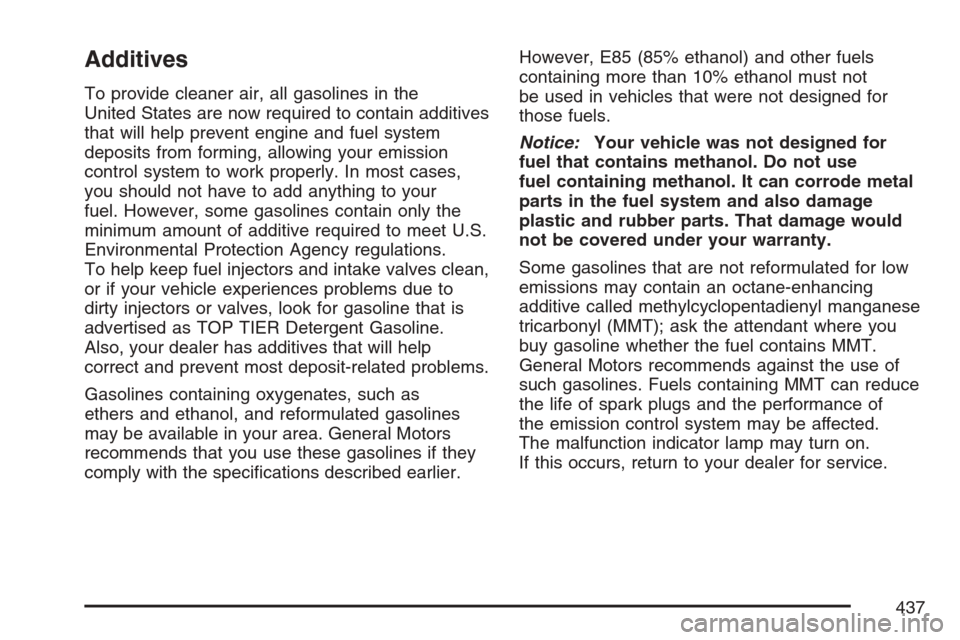
Additives
To provide cleaner air, all gasolines in the
United States are now required to contain additives
that will help prevent engine and fuel system
deposits from forming, allowing your emission
control system to work properly. In most cases,
you should not have to add anything to your
fuel. However, some gasolines contain only the
minimum amount of additive required to meet U.S.
Environmental Protection Agency regulations.
To help keep fuel injectors and intake valves clean,
or if your vehicle experiences problems due to
dirty injectors or valves, look for gasoline that is
advertised as TOP TIER Detergent Gasoline.
Also, your dealer has additives that will help
correct and prevent most deposit-related problems.
Gasolines containing oxygenates, such as
ethers and ethanol, and reformulated gasolines
may be available in your area. General Motors
recommends that you use these gasolines if they
comply with the speci�cations described earlier.However, E85 (85% ethanol) and other fuels
containing more than 10% ethanol must not
be used in vehicles that were not designed for
those fuels.
Notice:Your vehicle was not designed for
fuel that contains methanol. Do not use
fuel containing methanol. It can corrode metal
parts in the fuel system and also damage
plastic and rubber parts. That damage would
not be covered under your warranty.
Some gasolines that are not reformulated for low
emissions may contain an octane-enhancing
additive called methylcyclopentadienyl manganese
tricarbonyl (MMT); ask the attendant where you
buy gasoline whether the fuel contains MMT.
General Motors recommends against the use of
such gasolines. Fuels containing MMT can reduce
the life of spark plugs and the performance of
the emission control system may be affected.
The malfunction indicator lamp may turn on.
If this occurs, return to your dealer for service.
437
Page 474 of 618

Brake Wear
Your vehicle has four-wheel disc brakes.
Disc brake pads have built-in wear indicators that
make a high-pitched warning sound when the
brake pads are worn and new pads are needed.
The sound may come and go or be heard all
the time your vehicle is moving, except when
you are pushing on the brake pedal �rmly.
{CAUTION:
The brake wear warning sound means that
soon the brakes will not work well. That
could lead to an accident. When you hear
the brake wear warning sound, have your
vehicle serviced.
Notice:Continuing to drive with worn-out
brake pads could result in costly brake repair.Some driving conditions or climates may cause a
brake squeal when the brakes are �rst applied
or lightly applied. This does not mean something
is wrong with your brakes.
Properly torqued wheel nuts are necessary to help
prevent brake pulsation. When tires are rotated,
inspect brake pads for wear and evenly tighten
wheel nuts in the proper sequence to GM torque
speci�cations.
Brake linings should always be replaced as
complete axle sets.
Brake Pedal Travel
See your dealer if the brake pedal does not return
to normal height, or if there is a rapid increase
in pedal travel. This could be a sign of brake
trouble.
Brake Adjustment
Every time you make a brake stop, your disc
brakes adjust for wear.
474
Page 564 of 618
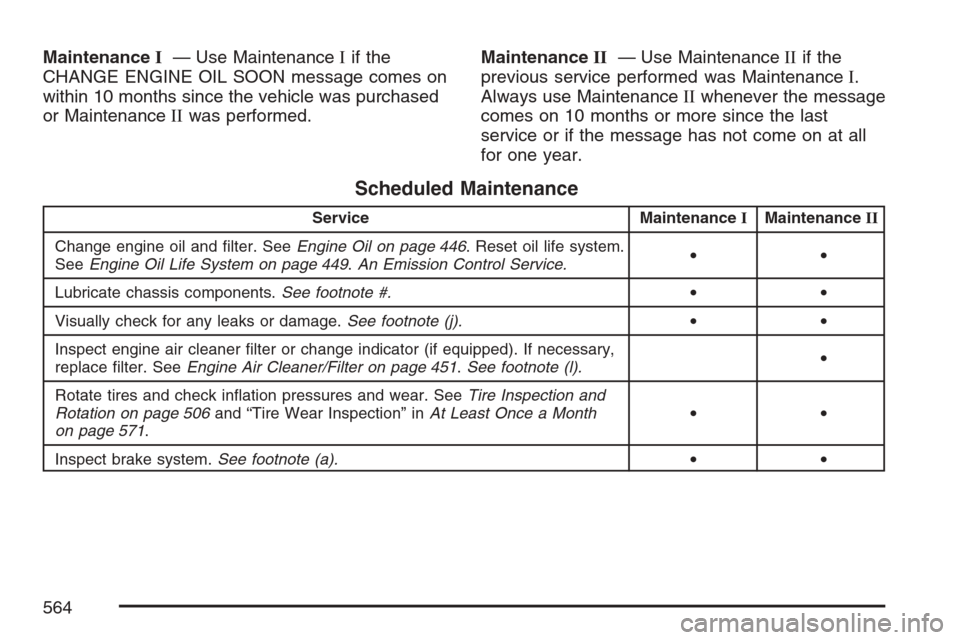
MaintenanceI— Use MaintenanceIif the
CHANGE ENGINE OIL SOON message comes on
within 10 months since the vehicle was purchased
or MaintenanceIIwas performed.MaintenanceII— Use MaintenanceIIif the
previous service performed was MaintenanceI.
Always use MaintenanceIIwhenever the message
comes on 10 months or more since the last
service or if the message has not come on at all
for one year.
Scheduled Maintenance
Service MaintenanceIMaintenanceII
Change engine oil and �lter. SeeEngine Oil on page 446. Reset oil life system.
SeeEngine Oil Life System on page 449.An Emission Control Service.••
Lubricate chassis components.See footnote #.••
Visually check for any leaks or damage.See footnote (j).••
Inspect engine air cleaner �lter or change indicator (if equipped). If necessary,
replace �lter. SeeEngine Air Cleaner/Filter on page 451.See footnote (l).•
Rotate tires and check in�ation pressures and wear. SeeTire Inspection and
Rotation on page 506and “Tire Wear Inspection” inAt Least Once a Month
on page 571.••
Inspect brake system.See footnote (a).••
564
Page 566 of 618
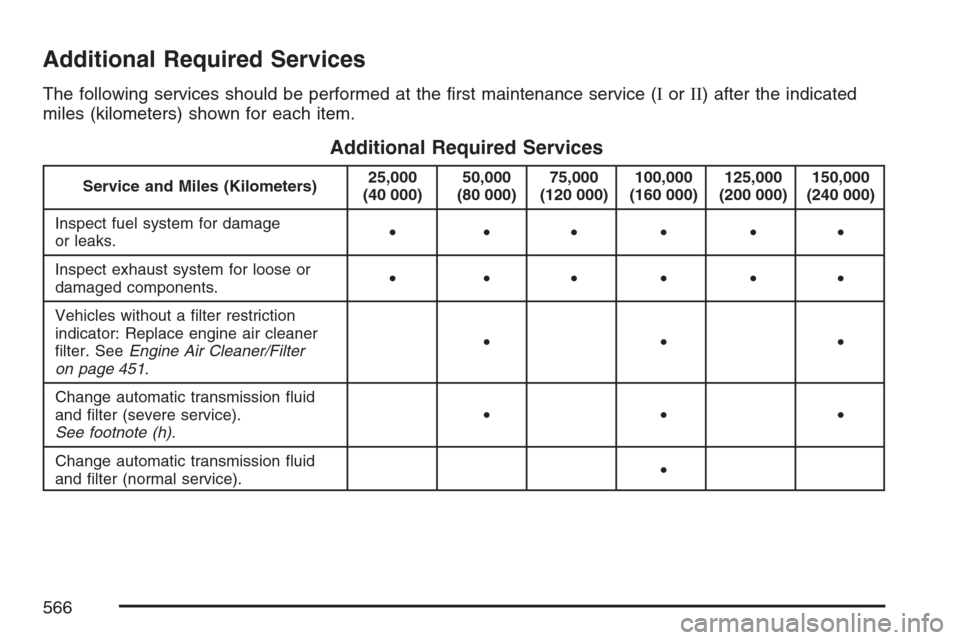
Additional Required Services
The following services should be performed at the �rst maintenance service (IorII) after the indicated
miles (kilometers) shown for each item.
Additional Required Services
Service and Miles (Kilometers)25,000
(40 000)50,000
(80 000)75,000
(120 000)100,000
(160 000)125,000
(200 000)150,000
(240 000)
Inspect fuel system for damage
or leaks.• •••••
Inspect exhaust system for loose or
damaged components.• •••••
Vehicles without a �lter restriction
indicator: Replace engine air cleaner
�lter. SeeEngine Air Cleaner/Filter
on page 451.•••
Change automatic transmission �uid
and �lter (severe service).
See footnote (h).•••
Change automatic transmission �uid
and �lter (normal service).•
566
Page 611 of 618

M
Maintenance Schedule
Additional Required Services.................... 566
At Each Fuel Fill...................................... 570
At Least Once a Month............................ 571
At Least Once a Year.............................. 571
Introduction.............................................. 560
Maintenance Footnotes............................ 568
Maintenance Record................................ 578
Maintenance Requirements...................... 560
Normal Maintenance
Replacement Parts............................... 576
Owner Checks and Services.................... 570
Recommended Fluids and Lubricants....... 574
Scheduled Maintenance........................... 563
Using....................................................... 561
Your Vehicle and the Environment............ 560
Malfunction Indicator Light........................... 250
Manual Seats.................................................. 9
Memory Seat, Mirrors, and Pedals................ 13
Message
DIC Warnings and Messages................... 267
Midgate
®..................................................... 105Mirrors
Automatic Dimming Rearview with
Compass and Temperature Display....... 148
Automatic Dimming Rearview
with OnStar
®, Compass and
Temperature Display............................. 145
Outside Power Foldaway Mirrors.............. 153
Outside Power Mirrors............................. 152
MP3 ...................................................319, 325
MyGMLink.com............................................ 585
N
Navigation/Radio System,
see Navigation Manual............................. 334
New Vehicle Break-In.................................. 122
Normal Maintenance Replacement Parts..... 576
611
Page 612 of 618

O
Odometer.................................................... 241
Odometer, Trip............................................ 241
Off-Road Driving.......................................... 368
Off-Road Recovery...................................... 365
Oil
Engine..................................................... 446
Pressure Gage......................................... 253
Pressure Light.......................................... 254
Oil, Engine Oil Life System......................... 449
Older Children, Restraints............................. 45
Online Owner Center................................... 585
OnStar
®System, see OnStar®Manual........ 156
Operation, Universal Home
Remote System..............................161, 166
Other Warning Devices................................ 206
Outlet Adjustment........................................ 238
Outlet(s), Accessory Power.......................... 226
Outside
Power Foldaway Mirrors........................... 153
Power Mirrors.......................................... 152
Overheated Engine Protection
Operating Mode....................................... 463
Owner Checks and Services....................... 570
Owners, Canadian.......................................... 3
P
Paint, Damage............................................ 544
Park Aid...................................................... 222
Park (P)
Shifting Into............................................. 139
Shifting Out of......................................... 141
Parking
Assist....................................................... 222
Brake....................................................... 138
Over Things That Burn............................ 142
Passenger Airbag Status Indicator............... 243
Passenger Sensing System........................... 81
Passing....................................................... 365
PASS-Key
®III+........................................... 120
PASS-Key®III+ Operation........................... 121
Power
Accessory Outlet(s).................................. 226
Door Locks.............................................. 103
Electrical System..................................... 547
Lumbar Controls........................................ 11
Retained Accessory (RAP)....................... 124
Running Boards....................................... 115
Seat.......................................................... 10
Steering Fluid.......................................... 469
Windows.................................................. 117
612
Page 615 of 618
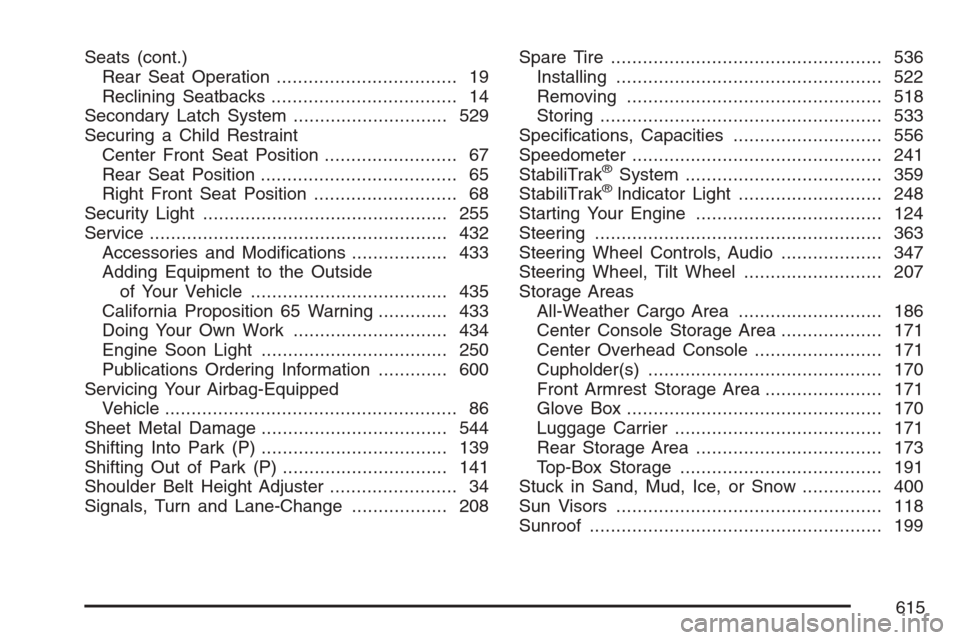
Seats (cont.)
Rear Seat Operation.................................. 19
Reclining Seatbacks................................... 14
Secondary Latch System............................. 529
Securing a Child Restraint
Center Front Seat Position......................... 67
Rear Seat Position..................................... 65
Right Front Seat Position........................... 68
Security Light.............................................. 255
Service........................................................ 432
Accessories and Modi�cations.................. 433
Adding Equipment to the Outside
of Your Vehicle..................................... 435
California Proposition 65 Warning............. 433
Doing Your Own Work............................. 434
Engine Soon Light................................... 250
Publications Ordering Information............. 600
Servicing Your Airbag-Equipped
Vehicle....................................................... 86
Sheet Metal Damage................................... 544
Shifting Into Park (P)................................... 139
Shifting Out of Park (P)............................... 141
Shoulder Belt Height Adjuster........................ 34
Signals, Turn and Lane-Change.................. 208Spare Tire................................................... 536
Installing.................................................. 522
Removing................................................ 518
Storing..................................................... 533
Speci�cations, Capacities............................ 556
Speedometer............................................... 241
StabiliTrak
®System..................................... 359
StabiliTrak®Indicator Light........................... 248
Starting Your Engine................................... 124
Steering...................................................... 363
Steering Wheel Controls, Audio................... 347
Steering Wheel, Tilt Wheel.......................... 207
Storage Areas
All-Weather Cargo Area........................... 186
Center Console Storage Area................... 171
Center Overhead Console........................ 171
Cupholder(s)............................................ 170
Front Armrest Storage Area...................... 171
Glove Box................................................ 170
Luggage Carrier....................................... 171
Rear Storage Area................................... 173
Top-Box Storage...................................... 191
Stuck in Sand, Mud, Ice, or Snow............... 400
Sun Visors.................................................. 118
Sunroof....................................................... 199
615